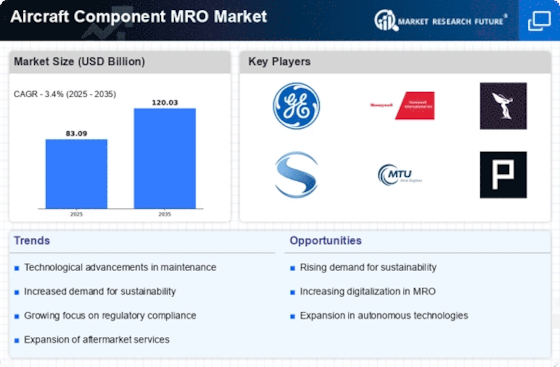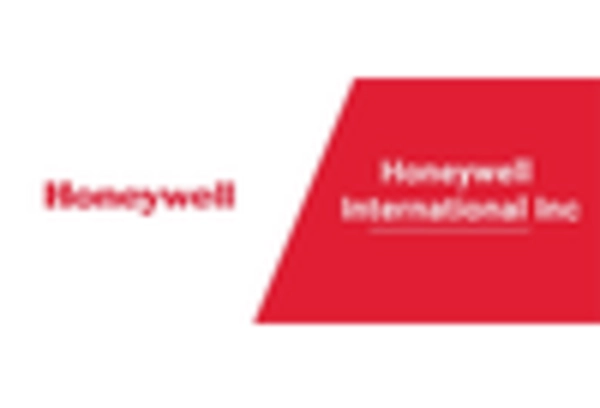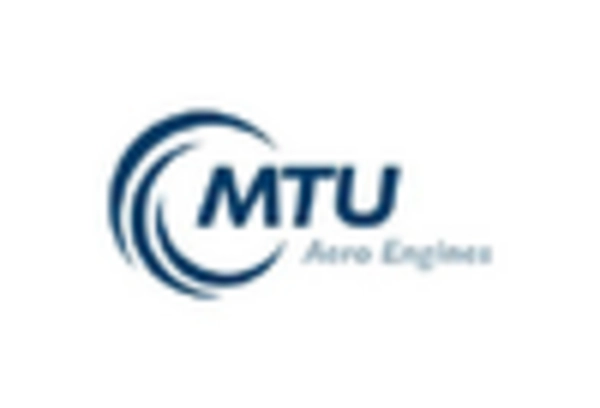Engine Components
Avionics
Landing Gear
Hydraulics
Fuel Systems
Metal
Composite
Plastic
Rubber
Ceramic
Repair
Overhauling
Maintenance
Modification
Inspection
Commercial Aviation
Military Aviation
Cargo Aircraft
Business Jets
Helicopters
North America
Europe
South America
Asia Pacific
Middle East and Africa
North America Outlook (USD Billion, 2019-2035)
North America Aircraft Component MRO Market by Component Type
Engine Components
Avionics
Landing Gear
Hydraulics
Fuel Systems
North America Aircraft Component MRO Market by Material Type
Metal
Composite
Plastic
Rubber
Ceramic
North America Aircraft Component MRO Market by Service Type
Repair
Overhauling
Maintenance
Modification
Inspection
North America Aircraft Component MRO Market by End Use Type
Commercial Aviation
Military Aviation
Cargo Aircraft
Business Jets
Helicopters
North America Aircraft Component MRO Market by Regional Type
US
Canada
US Outlook (USD Billion, 2019-2035)
US Aircraft Component MRO Market by Component Type
Engine Components
Avionics
Landing Gear
Hydraulics
Fuel Systems
US Aircraft Component MRO Market by Material Type
Metal
Composite
Plastic
Rubber
Ceramic
US Aircraft Component MRO Market by Service Type
Repair
Overhauling
Maintenance
Modification
Inspection
US Aircraft Component MRO Market by End Use Type
Commercial Aviation
Military Aviation
Cargo Aircraft
Business Jets
Helicopters
CANADA Outlook (USD Billion, 2019-2035)
CANADA Aircraft Component MRO Market by Component Type
Engine Components
Avionics
Landing Gear
Hydraulics
Fuel Systems
CANADA Aircraft Component MRO Market by Material Type
Metal
Composite
Plastic
Rubber
Ceramic
CANADA Aircraft Component MRO Market by Service Type
Repair
Overhauling
Maintenance
Modification
Inspection
CANADA Aircraft Component MRO Market by End Use Type
Commercial Aviation
Military Aviation
Cargo Aircraft
Business Jets
Helicopters
Europe Outlook (USD Billion, 2019-2035)
Europe Aircraft Component MRO Market by Component Type
Engine Components
Avionics
Landing Gear
Hydraulics
Fuel Systems
Europe Aircraft Component MRO Market by Material Type
Metal
Composite
Plastic
Rubber
Ceramic
Europe Aircraft Component MRO Market by Service Type
Repair
Overhauling
Maintenance
Modification
Inspection
Europe Aircraft Component MRO Market by End Use Type
Commercial Aviation
Military Aviation
Cargo Aircraft
Business Jets
Helicopters
Europe Aircraft Component MRO Market by Regional Type
Germany
UK
France
Russia
Italy
Spain
Rest of Europe
GERMANY Outlook (USD Billion, 2019-2035)
GERMANY Aircraft Component MRO Market by Component Type
Engine Components
Avionics
Landing Gear
Hydraulics
Fuel Systems
GERMANY Aircraft Component MRO Market by Material Type
Metal
Composite
Plastic
Rubber
Ceramic
GERMANY Aircraft Component MRO Market by Service Type
Repair
Overhauling
Maintenance
Modification
Inspection
GERMANY Aircraft Component MRO Market by End Use Type
Commercial Aviation
Military Aviation
Cargo Aircraft
Business Jets
Helicopters
UK Outlook (USD Billion, 2019-2035)
UK Aircraft Component MRO Market by Component Type
Engine Components
Avionics
Landing Gear
Hydraulics
Fuel Systems
UK Aircraft Component MRO Market by Material Type
Metal
Composite
Plastic
Rubber
Ceramic
UK Aircraft Component MRO Market by Service Type
Repair
Overhauling
Maintenance
Modification
Inspection
UK Aircraft Component MRO Market by End Use Type
Commercial Aviation
Military Aviation
Cargo Aircraft
Business Jets
Helicopters
FRANCE Outlook (USD Billion, 2019-2035)
FRANCE Aircraft Component MRO Market by Component Type
Engine Components
Avionics
Landing Gear
Hydraulics
Fuel Systems
FRANCE Aircraft Component MRO Market by Material Type
Metal
Composite
Plastic
Rubber
Ceramic
FRANCE Aircraft Component MRO Market by Service Type
Repair
Overhauling
Maintenance
Modification
Inspection
FRANCE Aircraft Component MRO Market by End Use Type
Commercial Aviation
Military Aviation
Cargo Aircraft
Business Jets
Helicopters
RUSSIA Outlook (USD Billion, 2019-2035)
RUSSIA Aircraft Component MRO Market by Component Type
Engine Components
Avionics
Landing Gear
Hydraulics
Fuel Systems
RUSSIA Aircraft Component MRO Market by Material Type
Metal
Composite
Plastic
Rubber
Ceramic
RUSSIA Aircraft Component MRO Market by Service Type
Repair
Overhauling
Maintenance
Modification
Inspection
RUSSIA Aircraft Component MRO Market by End Use Type
Commercial Aviation
Military Aviation
Cargo Aircraft
Business Jets
Helicopters
ITALY Outlook (USD Billion, 2019-2035)
ITALY Aircraft Component MRO Market by Component Type
Engine Components
Avionics
Landing Gear
Hydraulics
Fuel Systems
ITALY Aircraft Component MRO Market by Material Type
Metal
Composite
Plastic
Rubber
Ceramic
ITALY Aircraft Component MRO Market by Service Type
Repair
Overhauling
Maintenance
Modification
Inspection
ITALY Aircraft Component MRO Market by End Use Type
Commercial Aviation
Military Aviation
Cargo Aircraft
Business Jets
Helicopters
SPAIN Outlook (USD Billion, 2019-2035)
SPAIN Aircraft Component MRO Market by Component Type
Engine Components
Avionics
Landing Gear
Hydraulics
Fuel Systems
SPAIN Aircraft Component MRO Market by Material Type
Metal
Composite
Plastic
Rubber
Ceramic
SPAIN Aircraft Component MRO Market by Service Type
Repair
Overhauling
Maintenance
Modification
Inspection
SPAIN Aircraft Component MRO Market by End Use Type
Commercial Aviation
Military Aviation
Cargo Aircraft
Business Jets
Helicopters
REST OF EUROPE Outlook (USD Billion, 2019-2035)
REST OF EUROPE Aircraft Component MRO Market by Component Type
Engine Components
Avionics
Landing Gear
Hydraulics
Fuel Systems
REST OF EUROPE Aircraft Component MRO Market by Material Type
Metal
Composite
Plastic
Rubber
Ceramic
REST OF EUROPE Aircraft Component MRO Market by Service Type
Repair
Overhauling
Maintenance
Modification
Inspection
REST OF EUROPE Aircraft Component MRO Market by End Use Type
Commercial Aviation
Military Aviation
Cargo Aircraft
Business Jets
Helicopters
APAC Outlook (USD Billion, 2019-2035)
APAC Aircraft Component MRO Market by Component Type
Engine Components
Avionics
Landing Gear
Hydraulics
Fuel Systems
APAC Aircraft Component MRO Market by Material Type
Metal
Composite
Plastic
Rubber
Ceramic
APAC Aircraft Component MRO Market by Service Type
Repair
Overhauling
Maintenance
Modification
Inspection
APAC Aircraft Component MRO Market by End Use Type
Commercial Aviation
Military Aviation
Cargo Aircraft
Business Jets
Helicopters
APAC Aircraft Component MRO Market by Regional Type
China
India
Japan
South Korea
Malaysia
Thailand
Indonesia
Rest of APAC
CHINA Outlook (USD Billion, 2019-2035)
CHINA Aircraft Component MRO Market by Component Type
Engine Components
Avionics
Landing Gear
Hydraulics
Fuel Systems
CHINA Aircraft Component MRO Market by Material Type
Metal
Composite
Plastic
Rubber
Ceramic
CHINA Aircraft Component MRO Market by Service Type
Repair
Overhauling
Maintenance
Modification
Inspection
CHINA Aircraft Component MRO Market by End Use Type
Commercial Aviation
Military Aviation
Cargo Aircraft
Business Jets
Helicopters
INDIA Outlook (USD Billion, 2019-2035)
INDIA Aircraft Component MRO Market by Component Type
Engine Components
Avionics
Landing Gear
Hydraulics
Fuel Systems
INDIA Aircraft Component MRO Market by Material Type
Metal
Composite
Plastic
Rubber
Ceramic
INDIA Aircraft Component MRO Market by Service Type
Repair
Overhauling
Maintenance
Modification
Inspection
INDIA Aircraft Component MRO Market by End Use Type
Commercial Aviation
Military Aviation
Cargo Aircraft
Business Jets
Helicopters
JAPAN Outlook (USD Billion, 2019-2035)
JAPAN Aircraft Component MRO Market by Component Type
Engine Components
Avionics
Landing Gear
Hydraulics
Fuel Systems
JAPAN Aircraft Component MRO Market by Material Type
Metal
Composite
Plastic
Rubber
Ceramic
JAPAN Aircraft Component MRO Market by Service Type
Repair
Overhauling
Maintenance
Modification
Inspection
JAPAN Aircraft Component MRO Market by End Use Type
Commercial Aviation
Military Aviation
Cargo Aircraft
Business Jets
Helicopters
SOUTH KOREA Outlook (USD Billion, 2019-2035)
SOUTH KOREA Aircraft Component MRO Market by Component Type
Engine Components
Avionics
Landing Gear
Hydraulics
Fuel Systems
SOUTH KOREA Aircraft Component MRO Market by Material Type
Metal
Composite
Plastic
Rubber
Ceramic
SOUTH KOREA Aircraft Component MRO Market by Service Type
Repair
Overhauling
Maintenance
Modification
Inspection
SOUTH KOREA Aircraft Component MRO Market by End Use Type
Commercial Aviation
Military Aviation
Cargo Aircraft
Business Jets
Helicopters
MALAYSIA Outlook (USD Billion, 2019-2035)
MALAYSIA Aircraft Component MRO Market by Component Type
Engine Components
Avionics
Landing Gear
Hydraulics
Fuel Systems
MALAYSIA Aircraft Component MRO Market by Material Type
Metal
Composite
Plastic
Rubber
Ceramic
MALAYSIA Aircraft Component MRO Market by Service Type
Repair
Overhauling
Maintenance
Modification
Inspection
MALAYSIA Aircraft Component MRO Market by End Use Type
Commercial Aviation
Military Aviation
Cargo Aircraft
Business Jets
Helicopters
THAILAND Outlook (USD Billion, 2019-2035)
THAILAND Aircraft Component MRO Market by Component Type
Engine Components
Avionics
Landing Gear
Hydraulics
Fuel Systems
THAILAND Aircraft Component MRO Market by Material Type
Metal
Composite
Plastic
Rubber
Ceramic
THAILAND Aircraft Component MRO Market by Service Type
Repair
Overhauling
Maintenance
Modification
Inspection
THAILAND Aircraft Component MRO Market by End Use Type
Commercial Aviation
Military Aviation
Cargo Aircraft
Business Jets
Helicopters
INDONESIA Outlook (USD Billion, 2019-2035)
INDONESIA Aircraft Component MRO Market by Component Type
Engine Components
Avionics
Landing Gear
Hydraulics
Fuel Systems
INDONESIA Aircraft Component MRO Market by Material Type
Metal
Composite
Plastic
Rubber
Ceramic
INDONESIA Aircraft Component MRO Market by Service Type
Repair
Overhauling
Maintenance
Modification
Inspection
INDONESIA Aircraft Component MRO Market by End Use Type
Commercial Aviation
Military Aviation
Cargo Aircraft
Business Jets
Helicopters
REST OF APAC Outlook (USD Billion, 2019-2035)
REST OF APAC Aircraft Component MRO Market by Component Type
Engine Components
Avionics
Landing Gear
Hydraulics
Fuel Systems
REST OF APAC Aircraft Component MRO Market by Material Type
Metal
Composite
Plastic
Rubber
Ceramic
REST OF APAC Aircraft Component MRO Market by Service Type
Repair
Overhauling
Maintenance
Modification
Inspection
REST OF APAC Aircraft Component MRO Market by End Use Type
Commercial Aviation
Military Aviation
Cargo Aircraft
Business Jets
Helicopters
South America Outlook (USD Billion, 2019-2035)
South America Aircraft Component MRO Market by Component Type
Engine Components
Avionics
Landing Gear
Hydraulics
Fuel Systems
South America Aircraft Component MRO Market by Material Type
Metal
Composite
Plastic
Rubber
Ceramic
South America Aircraft Component MRO Market by Service Type
Repair
Overhauling
Maintenance
Modification
Inspection
South America Aircraft Component MRO Market by End Use Type
Commercial Aviation
Military Aviation
Cargo Aircraft
Business Jets
Helicopters
South America Aircraft Component MRO Market by Regional Type
Brazil
Mexico
Argentina
Rest of South America
BRAZIL Outlook (USD Billion, 2019-2035)
BRAZIL Aircraft Component MRO Market by Component Type
Engine Components
Avionics
Landing Gear
Hydraulics
Fuel Systems
BRAZIL Aircraft Component MRO Market by Material Type
Metal
Composite
Plastic
Rubber
Ceramic
BRAZIL Aircraft Component MRO Market by Service Type
Repair
Overhauling
Maintenance
Modification
Inspection
BRAZIL Aircraft Component MRO Market by End Use Type
Commercial Aviation
Military Aviation
Cargo Aircraft
Business Jets
Helicopters
MEXICO Outlook (USD Billion, 2019-2035)
MEXICO Aircraft Component MRO Market by Component Type
Engine Components
Avionics
Landing Gear
Hydraulics
Fuel Systems
MEXICO Aircraft Component MRO Market by Material Type
Metal
Composite
Plastic
Rubber
Ceramic
MEXICO Aircraft Component MRO Market by Service Type
Repair
Overhauling
Maintenance
Modification
Inspection
MEXICO Aircraft Component MRO Market by End Use Type
Commercial Aviation
Military Aviation
Cargo Aircraft
Business Jets
Helicopters
ARGENTINA Outlook (USD Billion, 2019-2035)
ARGENTINA Aircraft Component MRO Market by Component Type
Engine Components
Avionics
Landing Gear
Hydraulics
Fuel Systems
ARGENTINA Aircraft Component MRO Market by Material Type
Metal
Composite
Plastic
Rubber
Ceramic
ARGENTINA Aircraft Component MRO Market by Service Type
Repair
Overhauling
Maintenance
Modification
Inspection
ARGENTINA Aircraft Component MRO Market by End Use Type
Commercial Aviation
Military Aviation
Cargo Aircraft
Business Jets
Helicopters
REST OF SOUTH AMERICA Outlook (USD Billion, 2019-2035)
REST OF SOUTH AMERICA Aircraft Component MRO Market by Component Type
Engine Components
Avionics
Landing Gear
Hydraulics
Fuel Systems
REST OF SOUTH AMERICA Aircraft Component MRO Market by Material Type
Metal
Composite
Plastic
Rubber
Ceramic
REST OF SOUTH AMERICA Aircraft Component MRO Market by Service Type
Repair
Overhauling
Maintenance
Modification
Inspection
REST OF SOUTH AMERICA Aircraft Component MRO Market by End Use Type
Commercial Aviation
Military Aviation
Cargo Aircraft
Business Jets
Helicopters
MEA Outlook (USD Billion, 2019-2035)
MEA Aircraft Component MRO Market by Component Type
Engine Components
Avionics
Landing Gear
Hydraulics
Fuel Systems
MEA Aircraft Component MRO Market by Material Type
Metal
Composite
Plastic
Rubber
Ceramic
MEA Aircraft Component MRO Market by Service Type
Repair
Overhauling
Maintenance
Modification
Inspection
MEA Aircraft Component MRO Market by End Use Type
Commercial Aviation
Military Aviation
Cargo Aircraft
Business Jets
Helicopters
MEA Aircraft Component MRO Market by Regional Type
GCC Countries
South Africa
Rest of MEA
GCC COUNTRIES Outlook (USD Billion, 2019-2035)
GCC COUNTRIES Aircraft Component MRO Market by Component Type
Engine Components
Avionics
Landing Gear
Hydraulics
Fuel Systems
GCC COUNTRIES Aircraft Component MRO Market by Material Type
Metal
Composite
Plastic
Rubber
Ceramic
GCC COUNTRIES Aircraft Component MRO Market by Service Type
Repair
Overhauling
Maintenance
Modification
Inspection
GCC COUNTRIES Aircraft Component MRO Market by End Use Type
Commercial Aviation
Military Aviation
Cargo Aircraft
Business Jets
Helicopters
SOUTH AFRICA Outlook (USD Billion, 2019-2035)
SOUTH AFRICA Aircraft Component MRO Market by Component Type
Engine Components
Avionics
Landing Gear
Hydraulics
Fuel Systems
SOUTH AFRICA Aircraft Component MRO Market by Material Type
Metal
Composite
Plastic
Rubber
Ceramic
SOUTH AFRICA Aircraft Component MRO Market by Service Type
Repair
Overhauling
Maintenance
Modification
Inspection
SOUTH AFRICA Aircraft Component MRO Market by End Use Type
Commercial Aviation
Military Aviation
Cargo Aircraft
Business Jets
Helicopters
REST OF MEA Outlook (USD Billion, 2019-2035)
REST OF MEA Aircraft Component MRO Market by Component Type
Engine Components
Avionics
Landing Gear
Hydraulics
Fuel Systems
REST OF MEA Aircraft Component MRO Market by Material Type
Metal
Composite
Plastic
Rubber
Ceramic
REST OF MEA Aircraft Component MRO Market by Service Type
Repair
Overhauling
Maintenance
Modification
Inspection
REST OF MEA Aircraft Component MRO Market by End Use Type
Commercial Aviation
Military Aviation
Cargo Aircraft
Business Jets
Helicopters


















Leave a Comment